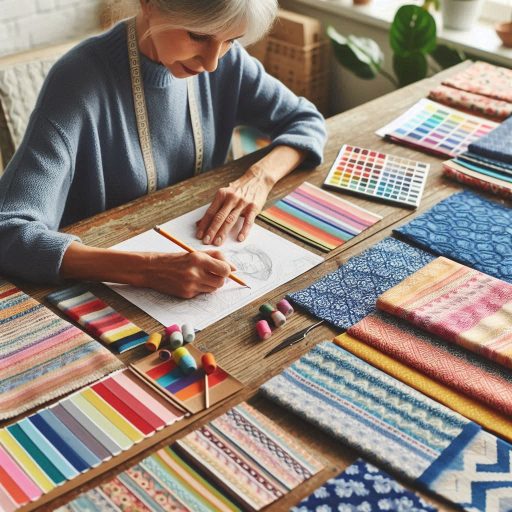Introduction
Networking is essential for aspiring textile designers looking to thrive in the industry.
Building connections opens doors to numerous opportunities and valuable resources.
In the textile design field, relationships can significantly impact your career trajectory.
Networking allows you to meet industry professionals who can provide insights, guidance, and collaboration possibilities.
It fosters an environment where sharing ideas leads to innovation and creativity.
Engaging with peers helps you stay updated on the latest trends, techniques, and materials.
Attend workshops, trade shows, and local events to expand your network and knowledge base.
These gatherings offer excellent platforms to showcase your work and connect with other designers, manufacturers, and potential clients.
Utilizing social media platforms like Instagram and LinkedIn can also help you connect with fellow designers and industry experts.
Join textile associations and online forums to access resources, educational opportunities, and mentorship.
Networking is not just about gaining contacts; it‘s about nurturing meaningful relationships that can support your growth.
Effective networking enhances your visibility in the industry and can lead to job offers and collaborations.
By actively participating in the textile community, you position yourself for success in this competitive field.
Start building your network today to support your journey as a textile designer, and watch your career flourish.
Build a Strong Online Presence
In today‘s digital age, a strong online presence is crucial for aspiring textile designers.
Here are three essential strategies to establish your visibility in the industry.
Create a Professional Portfolio Website Showcasing Your Work
Start by creating a professional portfolio website that showcases your best work.
Your portfolio should highlight your design skills and unique style.
Include high-quality images, project descriptions, and your design process.
Make sure to organize your work clearly to make it easy for visitors to navigate.
This website serves as your digital business card, attracting potential clients and employers.
Regularly update your portfolio with new projects to reflect your growth and creativity.
Use Social Media Platforms Like Instagram and LinkedIn to Connect with Industry Professionals
Utilize social media platforms to expand your network and visibility.
Instagram is a powerful tool for textile designers.
Share your designs, behind-the-scenes processes, and inspirations.
Use relevant hashtags to increase the reach of your posts.
Engage with followers by responding to comments and messages.
This interaction helps build a loyal audience and encourages community support.
LinkedIn is another essential platform for networking.
Create a professional profile that emphasizes your education, skills, and experiences.
Connect with industry professionals, potential employers, and fellow designers.
Join relevant groups to engage in discussions and share insights.
Regularly update your profile with new projects and achievements to keep your connections informed.
Join Online Textile Design Communities and Forums to Network with Like-Minded Individuals
Joining online textile design communities and forums is also beneficial.
These platforms allow you to connect with like-minded individuals who share your passion.
Participate in discussions, ask questions, and share your expertise.
This engagement can lead to valuable connections and potential collaborations.
Websites like Behance and Dribbble are excellent for showcasing your work and discovering other designers.
Attend virtual workshops and webinars hosted by industry professionals.
These events offer valuable insights and networking opportunities.
Engage actively by asking questions and sharing your thoughts during these sessions.
This participation can help you stand out among fellow attendees and forge meaningful connections.
Consider collaborating with other designers or artists online.
Joint projects can help you reach a wider audience and create unique designs.
Collaborations foster creativity and provide different perspectives on textile design.
Share the results of these projects on your social media and portfolio website.
Finally, remember to be authentic in your online presence.
Showcase your true self and passion for textile design.
Authenticity attracts people who resonate with your vision and values.
Building a strong online presence takes time and effort, but the rewards are significant.
By actively engaging online, you will create opportunities that propel your career forward.
Read: Visual Merchandising: Best Practices for Beginners
Attend Industry Events
Attend Trade Shows, Exhibitions, and Conferences Related to Textile Design
Attending industry events is crucial for aspiring textile designers.
Trade shows, exhibitions, and conferences offer invaluable opportunities to network and learn.
These events gather professionals, designers, and potential clients in one place.
Engaging with others can open doors to collaborations and job opportunities.
When you attend these events, prepare to make meaningful connections.
Bring business cards to share your contact information easily.
Introduce yourself confidently and be open to conversations.
Ask questions about other attendees‘ work to foster deeper connections.
Active listening helps you understand industry perspectives and insights.
Network with Other Professionals, Designers, and Potential Clients at These Events
Networking at these events enhances your knowledge base.
You can learn about the latest trends and innovations in textile design.
Workshops and panel discussions provide valuable insights from experienced professionals.
Stay engaged during these sessions and take notes on key points.
Connecting with potential clients is another benefit of attending industry events.
These gatherings allow you to meet decision-makers seeking fresh talent.
Approach clients with enthusiasm and confidence.
Share your portfolio and highlight your unique design approach.
Remember to follow up with them after the event to reinforce your connection.
Building relationships with fellow designers is equally important.
Networking with peers can lead to fruitful collaborations.
Share ideas and experiences to learn from each other.
Join discussions and consider participating in group projects.
These interactions can create lasting professional friendships.
Stay Updated on Industry Trends and News by Attending Such Events
Exhibitions showcase the latest products and technologies in the textile industry.
Observing new materials and techniques can inspire your own design work.
Take time to explore the exhibits and ask questions about the showcased items.
Understanding what‘s new in the market can keep your designs relevant.
Stay updated on industry trends by attending events regularly.
The textile design field evolves rapidly, and staying informed is vital.
Subscribe to newsletters or follow social media channels associated with these events.
This practice will help you anticipate changes and adapt your work accordingly.
Moreover, participating in these events can boost your confidence.
Each interaction enhances your communication skills and professional presence.
Practice speaking about your work and aspirations.
The more you engage with others, the more comfortable you will become.
Attending industry events is essential for aspiring textile designers.
These gatherings provide opportunities to network, learn, and grow.
Make a plan to attend relevant events regularly.
By doing so, you‘ll establish valuable connections and stay informed about the latest trends.
This proactive approach will undoubtedly elevate your career in textile design.
Read: Collaborating with Other Creative Roles
Reach Out to Designers and Professionals
Send Personalized Emails or Messages to Established Designers in the Industry
Reaching out to industry professionals is a vital step for aspiring textile designers.
Start by identifying established designers whose work you admire.
Research their backgrounds and recent projects to personalize your outreach.
Craft a thoughtful email or message that reflects your genuine interest in their work.
Mention specific projects or aspects that resonate with you.
Personalization shows that you value their time and expertise.
A generic message may not receive a response.
Keep your message concise and clear, expressing who you are and what you seek.
Aim for a friendly tone while maintaining professionalism.
Ask for Advice, Feedback, or Opportunities to Collaborate
In your outreach, consider asking for advice or feedback on your designs.
Many established designers appreciate the opportunity to mentor emerging talent.
Clearly articulate what you hope to learn from them.
This could include insights about trends, techniques, or career paths in textile design.
You can also inquire about potential collaboration opportunities.
Working together can be mutually beneficial, allowing both parties to share ideas and expertise.
If you have specific project ideas in mind, share them in your message.
This can spark interest and create an avenue for partnership.
Building Relationships with Experienced Professionals Can Open Doors for New Opportunities
Building relationships with experienced professionals can significantly impact your career.
Networking fosters connections that may lead to job opportunities or collaborations.
Maintain a positive and respectful approach in all interactions.
Follow up with gratitude after receiving feedback or advice.
Attend industry events where these professionals may be present.
This allows for face-to-face interactions, enhancing your relationship.
A personal connection can often lead to more significant opportunities down the line.
Be open to ongoing communication and keep them updated on your progress.
Additionally, engage with their work on social media.
Comment on their posts, share their content, and express appreciation for their insights.
This engagement helps you stay on their radar and builds rapport over time.
Reaching out to designers and professionals is crucial for aspiring textile designers.
Personalized communication lays the foundation for meaningful connections.
By seeking advice and exploring collaboration, you can tap into valuable industry knowledge.
Building these relationships opens doors to new opportunities and propels your career forward.
Make this practice a regular part of your professional journey.
Read: Breaking Down Iconic Movie Costumes

Participate in Workshops and Networking Events
Join Local Textile Design Workshops or Networking Events
Participating in workshops and networking events is essential for aspiring textile designers.
Local workshops offer hands-on learning experiences that enhance your skills.
They provide opportunities to work with various materials and techniques.
Joining these workshops allows you to connect with other passionate designers in your area.
Networking events also create a platform for interaction with industry professionals.
These gatherings often feature a mix of established designers and emerging talent.
Engaging with this diverse group can lead to new friendships and professional relationships.
Be proactive in introducing yourself and sharing your interests.
Attend Talks, Panel Discussions, and Workshops to Learn from Industry Experts
Attending talks and panel discussions is an excellent way to gain insights from industry experts.
These events often feature seasoned professionals sharing their knowledge and experiences.
Listen carefully to their advice and take notes on key points that resonate with you.
Workshops conducted by experts allow for direct interaction and skill-building.
They often focus on specific topics, such as sustainable design or advanced techniques.
Participating actively in these sessions enhances your understanding and practical abilities.
Don’t hesitate to ask questions to clarify concepts and deepen your learning.
Engage in Conversations and Exchange Contacts with Fellow Designers and Professionals
Engaging in conversations is key to maximizing your experience at workshops and events.
Approach fellow attendees with an open mind and genuine interest.
Share your experiences and ask about their design journeys.
This mutual exchange fosters connections and can lead to collaborative opportunities.
Always have business cards or contact information ready to share.
Exchanging contacts makes it easier to follow up after the event.
Reach out to those you meet with a friendly message, thanking them for the conversation.
This simple gesture reinforces your connection and keeps the dialogue open.
Moreover, consider following up on social media.
Platforms like Instagram and LinkedIn allow you to maintain contact and engage with their work.
Commenting on their posts or sharing relevant content can help keep the relationship alive.
Participating in workshops and networking events is crucial for aspiring textile designers.
These experiences offer learning opportunities and foster valuable connections.
Join local workshops to enhance your skills and meet like-minded individuals.
Attend talks and discussions to gain insights from industry experts.
By engaging in meaningful conversations and exchanging contacts, you can build a network that supports your career growth.
Make it a priority to participate regularly in these enriching events.
Read: Networking Events for Costume Designers
Offer to Volunteer or Intern
Offer Your Services as a Volunteer or Intern at Design Studios, Textile Companies, or Fashion Houses
Volunteering or interning is a proactive step for aspiring textile designers.
Offer your services at design studios, textile companies, or fashion houses to gain practical experience.
Many organizations appreciate the support of eager learners.
Reach out directly to express your interest and enthusiasm for their work.
When applying for internships or volunteer positions, highlight your skills and passion for textile design.
Tailor your application to showcase relevant experiences or projects.
A well-crafted portfolio can impress potential employers and demonstrate your capabilities.
Your initiative in seeking these opportunities reflects your commitment to the field.
Gain Hands-On Experience, Expand Your Network, and Showcase Your Talent
Internships provide invaluable hands-on experience that classroom learning often lacks.
Working on real projects allows you to apply your skills in a practical setting.
You’ll learn about industry processes, workflows, and standards directly from professionals.
Moreover, volunteering or interning helps you expand your professional network.
You‘ll interact with experienced designers and industry peers daily.
These connections can lead to mentorship opportunities and valuable advice.
Engage with your colleagues, ask questions, and show eagerness to learn.
Building relationships within the organization can yield benefits long after your internship ends.
Additionally, internships allow you to showcase your talent in a professional environment.
By contributing to projects, you demonstrate your skills and creativity.
This experience can bolster your confidence and reinforce your design identity.
Employers often notice interns who take initiative and contribute effectively to team goals.
Transform Your Career Today
Unlock a personalized career strategy that drives real results. Get tailored advice and a roadmap designed just for you.
Start NowInternships Can Lead to Potential Job Opportunities and Valuable Connections in the Industry
One of the significant advantages of internships is the potential for job opportunities.
Many companies prefer to hire interns who have already proven themselves within the organization.
If you excel during your internship, you may be considered for a full-time position.
Additionally, the connections you make during your internship can be invaluable.
Colleagues you meet might provide recommendations or referrals in the future.
Keep in touch with your contacts after your internship ends.
A simple message or occasional update can maintain these important relationships.
Offering to volunteer or intern is a vital strategy for aspiring textile designers.
These opportunities provide hands-on experience and allow you to showcase your talent.
By gaining experience in design studios or fashion houses, you can expand your network significantly.
This proactive approach can lead to potential job opportunities and lasting connections in the industry.
Make volunteering or interning a key part of your career development plan.
You Might Also Like: Typography Resources: Books, Blogs, and Tutorials
Collaborate with Other Designers
Collaborate on Projects with Other Designers, Artists, or Brands
Collaboration is a powerful strategy for aspiring textile designers.
Working with other designers, artists, or brands can significantly enhance your creative output.
Collaborative projects allow you to merge different styles, techniques, and ideas.
This blending of perspectives can lead to innovative designs that stand out in the industry.
Reach out to fellow designers or artists whose work you admire.
Discuss potential collaboration opportunities and brainstorm ideas together.
Establish clear roles and responsibilities to ensure a smooth working relationship.
By collaborating, you not only create unique pieces but also expand your creative toolkit.
Participate in Design Competitions or Collaborative Exhibitions
Design competitions are another excellent avenue for collaboration.
Many competitions encourage teams to submit their work, fostering a collaborative spirit.
Participating in these competitions can provide exposure to a broader audience.
It‘s an opportunity to showcase your work alongside talented peers.
Collaborative exhibitions also offer platforms to display your designs.
These events often attract industry professionals and potential clients.
Work with others to create cohesive collections that highlight each designer’s strengths.
Sharing the spotlight in this way can enhance your visibility in the industry.
Working with Other Creatives Can Provide Exposure, New Perspectives, and Networking Opportunities
Collaboration opens doors to new perspectives that enrich your design process.
By working with others, you gain insights into different creative approaches and techniques.
This exposure can inspire you to explore new styles or materials.
Embrace feedback and suggestions from your collaborators to refine your work further.
Moreover, collaborating with other creatives expands your professional network.
Each designer or artist you work with brings their connections to the table.
Building relationships within this network can lead to future opportunities.
You may find yourself invited to other projects, exhibitions, or events through these connections.
Collaborating with other designers is essential for aspiring textile designers.
Working on projects with peers, participating in design competitions, and engaging in collaborative exhibitions provide numerous benefits.
This approach not only enhances your skills but also exposes you to new ideas and opportunities.
Make collaboration a key part of your professional journey to broaden your creative horizons and build a strong network in the industry.
See Related Content: Famous Lighting Designers and Their Work
Gain More Insights: Advertising Design: How to Present Your Work to Clients
Follow Up and Stay in Touch
After Networking Events or Meetings, Follow Up with a Thank You Note or Email
Following up after networking events or meetings is crucial for maintaining connections.
A simple thank you note or email can leave a lasting impression.
Express your gratitude for the time spent together and any insights gained from the conversation.
Personalize your message by referencing specific topics discussed, showing that you value the interaction.
Sending a follow-up note within 24 to 48 hours keeps you fresh in their memory.
This timely communication reinforces your enthusiasm and professionalism.
A well-crafted thank you note sets the tone for a potential ongoing relationship.
Always be polite and concise, ensuring your message conveys appreciation without overwhelming the recipient.
Stay Connected with Your Contacts Through Regular Updates on Your Work or Projects
Staying in touch with your contacts is vital for nurturing relationships.
Share regular updates on your work or projects to keep them informed.
This could include sharing new designs, exhibitions, or any achievements.
Use email newsletters, social media posts, or direct messages to maintain visibility in their networks.
Engaging with your contacts on social media is also beneficial.
Comment on their posts, share their work, or tag them when relevant.
This ongoing interaction helps to sustain the relationship and shows that you‘re genuinely interested in their activities.
By staying engaged, you create a two-way street in the relationship, making it more meaningful.
Building and Maintaining Relationships Is Key to Successful Networking in the Textile Design Industry
Building and maintaining relationships is essential for successful networking in the textile design industry.
Connections can lead to collaborations, job opportunities, or mentorship.
Approach networking with the mindset of creating lasting relationships rather than just collecting contacts.
Be proactive in reaching out, especially during significant events or milestones.
Congratulate your contacts on their achievements or simply check in to see how they‘re doing.
This thoughtful approach shows that you care about the relationship beyond professional gain.
Following up and staying in touch are critical components of effective networking.
Sending thank you notes and sharing updates keeps the lines of communication open.
By nurturing these relationships, you enhance your professional network and open doors to new opportunities.
Make it a habit to connect regularly with your contacts to strengthen your presence in the textile design industry.
Conclusion
Networking is crucial for aspiring textile designers seeking to build a successful career.
It opens doors to valuable connections, collaborations, and opportunities that can shape your future in the industry.
By engaging with professionals in the field, you gain insights and advice that enhance your design skills and business acumen.
Implementing the networking tips discussed in this blog can significantly elevate your professional presence.
Attend industry events, workshops, and trade shows to meet fellow designers and industry leaders.
Join online communities and social media groups focused on textile design to stay connected with the latest trends and insights.
Engaging in conversations and sharing your work can attract attention and foster relationships.
Building relationships with mentors and peers can lead to job offers, internships, and collaborative projects.
Remember, each connection can introduce you to new possibilities and resources.
Networking is not just about exchanging business cards; it‘s about creating meaningful relationships that support your growth.
Embrace networking as a vital tool in your journey as a textile designer.
Start today by reaching out, engaging with others, and making yourself known in the industry.
By actively participating in networking opportunities, you can expand your reach and influence.
Ultimately, these efforts can lead to a more fulfilling and successful career in textile design.
As you build your network, watch your opportunities grow and transform your aspirations into reality.




